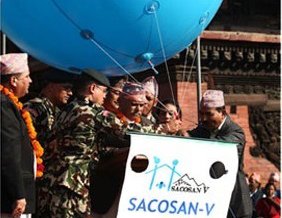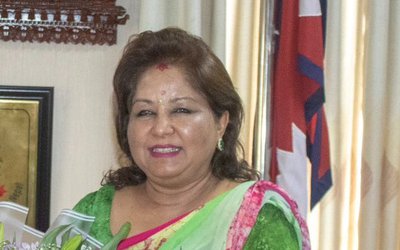
Sita Tamang, 13, a girl student of Narayansthan Village Development Committee of Kavreplanchowk district, is not regular in school. She periodically disappears from the class for days in a month. This irregularity hampers her studies. In the absence of girl-friendly toilets and family’s lack of economic capability to provide sanitary pads, she cannot attend the school during menstruation.
Sita Tamang is not alone in that situation. According to the Ministry of Education, annually, thousands of girl students drop out of school due to the lack of separate toilets or girl-friendly toilets. The issue got some attention on November 19, the Election Day, as it coincided with the World Toilet Day, as well.
“Nepal is currently 12 years off track from meeting the sanitation Millennium Development Goals (MDGs) target, which was due to be completed in 2015. Every year it is estimated that around 4,500 women and girls die from diseases brought about from a lack of access to sanitation and water in Nepal. We can and should be doing better,” said Asutosh Tiwari, country representative of WaterAid Nepal.
The slogans of this year's World Toilet Day is “We Can’t Wait – Governments, civil society and business should work together to tackle sanitation for women’s health in Nepal.”
According to WaterAid Nepal press release, World Toilet Day, is a day when those of us with access to clean, safe toilets should all take a minute to be grateful.
According to a survey, thirty-five percent of the earth’s population (2.5 billion people) don’t have such access. Giving them access would generate $220 billion in economic gains annually, according to the World Bank, $114 billion of which is due to the freeing up of time that would no longer be spent in search of a clean place to defecate.
"A collaborative approach between the Nepali Government, civil society and business is essential to getting the Millennium Development Goal of sanitation target back on track in order to improve the health and prosperity of women in the country," said Tiwari.
Nepal recently successfully hosted SACOCAN V calling for greater access of toilets to schools focusing to the girl. “Nepal government is aware of the situation and it has been working with utmost efforts to increase the sanitation for all," said Kishore Thapa, secretary of Ministry of Urban Development.
A new report jointly published on World Toilet Day by the United Nations hosted organisation Water Supply and Sanitation Collaborative Council, international charity WaterAid and Unilever revealed that there is gloomy picture about access to toilets.
The report is published on the first UN recognised World Toilet Day, which serves as a reminder of the 19.6 million people lacking access to an adequate toilet in Nepal, with devastating consequences in particular for the well-being, health, education and empowerment of women and girls in the country.
The report highlights the stark consequences for women and girls of the lack of access to toilets. Over six out of ten women in Nepal risk shame, disease, harassment and even attack because they have nowhere safe to go to the toilet and 6.6 million Nepali women have no choice but to go to the toilet out in the open.
This is the first time the three organisations, representing the worlds of business, UN and NGOs, have come together in this way on sanitation. The report brings together real life case studies of people, alongside research from a variety of organisations and agencies that examine the impact of a lack of sanitation on women and girls.
In the report, UN Deputy-Secretary General, Jan Eliasson, and Paul Polman, Unilever Chief Executive Officer, declare: “One person in three lacks access to adequate sanitation. The result is widespread death and diseases – especially among children – and social marginalisation. Women are particularly vulnerable.
“Poor sanitation exposes females to the risk of assault, and when schools cannot provide clean, safe, toilets girls’ attendance drops. We simply cannot wait. By acting decisively we can now make a positive impact on global health, education, women’s safety, social equality and economic growth for generations to come.”
The post-2015 development framework to succeed the Millennium Development Goals needs to address water, sanitation and hygiene as priority issues, set ambitious targets to achieve universal access to water, sanitation and hygiene, and gradually reduce and eventually eliminate inequalities in access and use.
Sanitation should be integrated into education policy supported by sufficient resources and concrete plans to ensure that: All schools have adequate sanitation facilities including hand washing facilities and separate toilets for boys and girls with access for students with disabilities. Specific provision is made at school for establishing proper menstrual hygiene management facilities.
The decision to mark World Toilet Day on 19 November was aimed to help the UN raise awareness and mobilize action that can save millions of lives. Some 2.5 billion people lack toilets and poor sanitation is a leading cause of disease and child deaths. Adopting a new resolution, the General Assembly urged UN Member States and relevant stakeholders to encourage behavioural change and the implementation of policies to increase access to sanitation among the poor, along with a call to end the practice of open defecation.
While the government has set 2017 as the deadline for meeting the universal target for access to basic sanitation by all the citizens of Nepal, the present achievement rate has been sluggish. Nepal government has to declare all 75 districts as ODF in four years. But, only 915 VDCs among the total 3915 have become ODF till now, which is only 24 percent of the total VDCs.
WaterAid Nepal together with Federation of Drinking Water and Sanitation Users Nepal (FEDWASUN) carried out an interactive session with political leaders on 29 July 2013. The purpose of this program was to sensitize political leaders on the importance of the roles they play in promoting sanitation in Nepal. The political party leaders were persuaded to commit for sanitation with special regard to ODF declaration seventy five political parties were invited in the interaction. This interaction was also followed by the public launch of the toolkit supporting declaration of the Open Defecation Free (ODF) areas.
- FOREIGN EXCHANGE: Largest Deposit
- Jul 22, 2024
- IMF: Approval Of SDR
- Jul 22, 2024
- NEPAL-KOREA RELATIONS: Fifty-Years Of Warm Relations
- May 31, 2024
- NEPAL-BRITAIN: Centenary Celebration
- May 31, 2024
- POLITCS: Forming New Alliances
- May 27, 2024
















